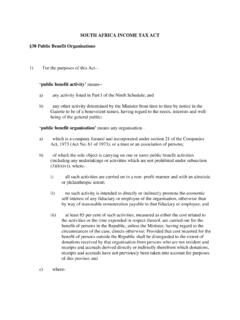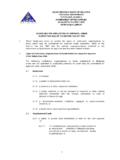Transcription of Evaluating Development Activities 12 Lessons from ... - OECD
1 Evaluating Development Activities12 Lessons from the OECD DAC1212 Evaluating Development Activities 12 Lessons from the OECD DACE valuating Development Activities 12 Lessons from the OECD DACThe organisation for Economic Co-operation and Development is a unique forum where the governments of 34 democracies work together to address the economic, social and environmental challenges of globalisation. The OECD is also at the forefront of efforts to understand and to help governments respond to new developments and concerns, such as corporate governance, the information economy and the challenges of an ageing population. The organisation provides a setting where governments can compare policy experiences, seek answers to common problems, identify good practice and work to co-ordinate domestic and international order to achieve its aims the OECD has a number of specialised committees.
2 One of these is the Development Assistance Committee (DAC), whose members have agreed to secure an expansion of aggregate volume of resources made available to developing countries and to improve their effectiveness. To this end, members periodically review together both the amount and the nature of their contributions to aid programmes, bilateral and multilateral, and consult each other on all other relevant aspects of their Development assistance policies. The members of the Development Assistance Committee are: Australia, Austria, Belgium, Canada, Czech Republic, Denmark, Finland, France, Germany, Greece, Iceland, Ireland, Italy, Japan, Korea, Luxembourg, the Netherlands, New Zealand, Norway, Portugal, Spain, Sweden, Switzerland, the United Kingdom, the United States and the European work is published on the responsibility of the Secretary-General of the OECD.
3 The opinions expressed and arguments employed herein do not necessarily reflect the official views of the organisation or of the governments of its member document and any map included herein are without prejudice to the status of or sovereignty over any territory, to the delimitation of international frontiers and boundaries and to the name of any territory, city or to OECD publications may be found on line at: OECD 2013 You can copy, download or print OECD content for your own use, and you can include excerpts from OECD publications, databases and multimedia products in your own documents, presentations, blogs, websites and teaching materials, provided that suitable acknowledgment of OECD as source and copyright owner is requests for public or commercial use and translation rights should be submitted to for permission to photocopy portions of this material for public or commercial use shall be addressed directly to the Copyright Clearance Center (CCC) at or the Centre fran ais d exploitation du droit de copie (CFC) at OF CONTENTSP reface Introduction The strategic framework for learning and accountability lesson 1.
4 Base Development policy decisions on evidence lesson 2: Make learning part of the culture of Development co-operation lesson 3: Define a clear role for evaluationDelivering evaluations effectively lesson 4: Match ambitions with adequate resources lesson 5: Strengthen programme design and management systems lesson 6: Ask the right questions and be realistic about expected results lesson 7: Choose the right evaluation tools lesson 8: Work together lesson 9: Help strengthen partner country capacities and use themStrengthening the culture of learning lesson 10: Act on evaluation findings lesson 11: Communicate evaluation results effectively lesson 12: Evaluate the evaluatorsReferences and further readingUseful web resourcesAnnex A: Evaluation systems and use: a working tool for peer reviews and assessments5 7 99131721212325272933353539434751 524 Lessons from evaluation studies have shaped our current approach to Development .
5 Evaluating Development Activities : 12 Lessons FROM THE OECD DAC5 PREFACEThe 12 Lessons series pulls together knowledge on good practice in Development co-operation from the OECD Development Assistance Committee (DAC), drawing in particular on the findings of the DAC s peer reviews. Peer reviews of DAC members are based on the dual principles of peer pressure and peer learning. The reviews are the only international process regularly to examine key bilateral Development co-operation systems and offer constructive commentary for their reform. In doing so, peer reviews constitute a yardstick against which the DAC can measure the influence or lack of it of its good practice principles on members behaviour, both in the field and at headquarters.
6 The ultimate aims of DAC peer reviews are to:1. Help improve the quality and quantity of Development Provide credible analyses based on common principles that can be used by both OECD countries and the wider international Enable DAC members to share experiences, identify good practices and improve Development co-operation Activities is one of the areas where the DAC s influence on policy and practice can most readily be observed. Having an evaluation system that is well-established is one of the conditions of becoming a member of the DAC. Each peer review examines the set-up and management of the evaluation function, using the norms and standards developed by the DAC s Network on Development Evaluation. The Network is one of the longest standing subsidiary bodies of the DAC and evaluation is now used extensively by donors, partner governments and implementing agencies.
7 The OECD DAC s Principles for Evaluation of Development Assistance (OECD, 1991) are at the heart of the DAC s approach to evaluation. The principles focus on the management of the evaluation function. The Quality Standards for Development Evaluation, approved in 2010, complement these principles with guidance on the evaluation process and report. These provide the standards on which member countries are assessed in the DAC peer reviews. Shared standards also contribute to collaboration, in line with the commitments to improve co-ordination 6and make aid more effective. Periodic reviews look at how evaluation systems are evolving and examine current issues in member agencies; see for instance the most recent review Evaluation in Development Agencies (OECD, 2010a).
8 This booklet outlines 12 important Lessons on Development evaluation, drawing on experiences of the members of the Network on Development Evaluation and the findings of DAC peer reviews from 2009 to 2012 (see References for complete list). Each section explains the importance of the lesson for Development co-operation agencies and provides examples. Lessons are grouped under the following headings: the strategic framework, delivering effective evaluation and building a culture of learning. This publication was written by Megan G. Kennedy-Chouane, Policy Analyst, with Hans Lundgren, Head of the Evaluation Unit, of the OECD Development Co-operation Directorate s Review, Evaluation & Engagement Division. Valuable comments and feedback were provided by the members of the DAC Network on Development Evaluation.
9 Australia, Canada, Japan, Norway and Poland provided oversight as members of the DAC editorial board and Ida McDonnell managed the process for the OECD. The 12 Lessons series, covering a range of current issues and targeted at Development policy professionals, has been developed under the direction and guidance of Karen Jorgensen, Head of the Review, Evaluation and Engagement Division of the OECD s Development Co-operation Directorate. Managers [..] should base their decisions on a clear understanding of which interventions are most likely to achieve the desired results in a particular context. Evaluating Development Activities : 12 Lessons FROM THE OECD DAC7 INTRODUCTIONBy Erik Solheim, Chair of the Development Assistance Committee of the OECDE valuation is at the heart of current efforts to make Development co-operation more effective at supporting economic growth and reducing poverty.
10 Questions about whether or not aid works have pre-occupied the OECD s Development Assistance Committee (DAC) since the group s early days. Today, in the face of fiscal retrenchment and mounting aid scepticism, we face even more pressure to demonstrate the results of Development Activities . Donor and partner governments alike need more credible, timely evidence about their performance. While acknowledging that aid alone cannot drive Development , we must strive to better understand how different types of Development co-operation and finance, including official Development assistance (ODA), fit together to improve outcomes for poor people around the world. Evaluation has an invaluable role to play in providing answers to these questions.















